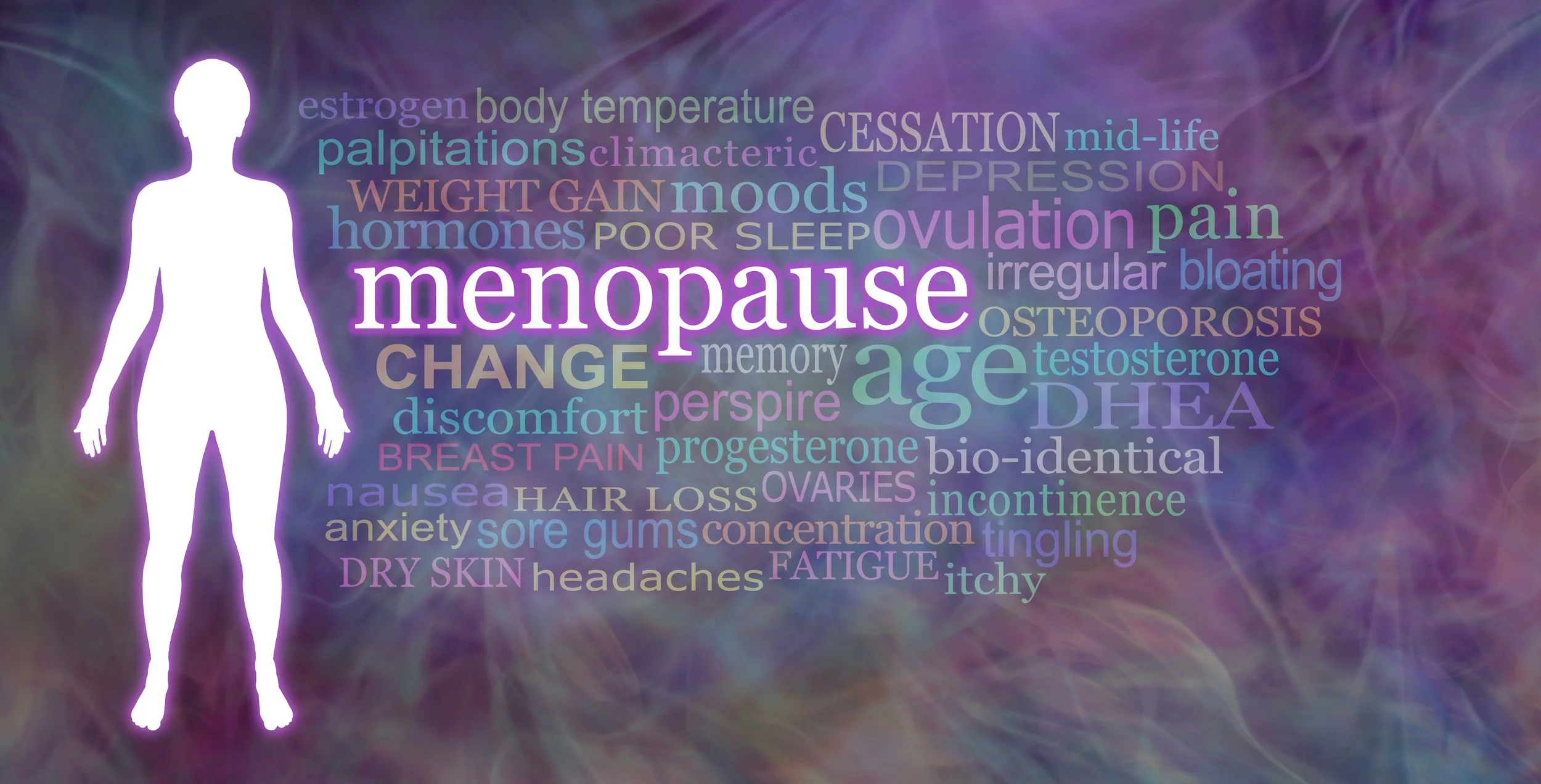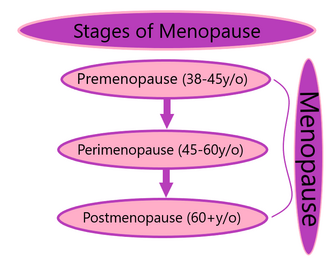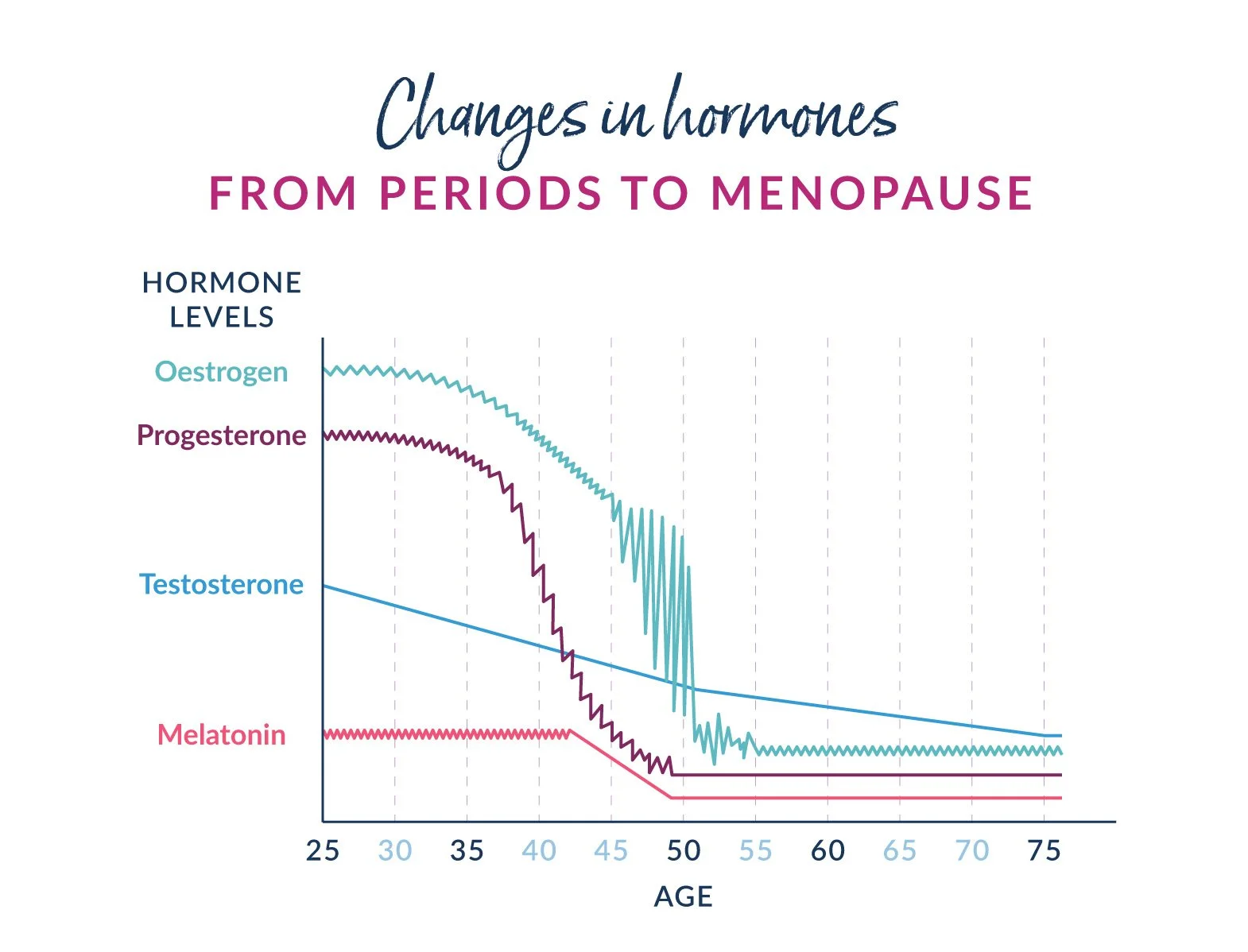Menopause: A Season of Renewal, Wisdom, and Nourishment
Every October, while the world fills with pink ribbons for Breast Cancer Awareness, another important movement quietly takes place: Menopause Awareness Month. It doesn’t get as much attention—sometimes it barely gets a mention at all. But for millions of women around the world, menopause is a very real and often misunderstood chapter of life.
A Personal Journey
I don’t remember much about the exact time I went through menopause, but I do remember how lost I felt. I was in my early fifties, and my mom had sent me an article about perimenopause. I skimmed it, tucked it away, and didn’t think much more about it. After all, I had always been regular—like clockwork. I knew when my period would start, how long it would last, what to expect.
Then suddenly, nothing was predictable anymore. My cycles started shifting. Some months they came early, others late, and when they did come, the bleeding was heavier. It felt unsettling. I started doing my own research—though back then, nearly fifteen years ago, information was sparse. There weren’t countless blogs, podcasts, or support groups like there are now. So I turned to the health food stores, searching for something—anything—that could help.
That’s where I first found natural progesterone made from wild yams, and to my surprise, it helped. I felt more balanced. But after menopause officially arrived, I assumed that chapter was over, so I stopped supplementing. That’s when everything seemed to catch up with me. I was exhausted all the time. The hot flashes came on strong.
At the time, the big name everyone was talking about was Estroven, an over-the-counter supplement. I dug into the ingredients and discovered it was mostly derived from maca root. So I did what I always do—I researched, learned all I could, and began supplementing with white maca from Peru. For several years, it worked beautifully. My hot flashes eased, and I felt like I had my footing again.
But then came another wave of changes starting with my vagina. Lubrication decreased, sex became painful, and mild incontinence crept in. The maca no longer worked, and the hot flashes returned—worse than ever. I remember thinking, There has to be something more I can do.
So I dove back into research and discovered bioidentical hormone replacement therapy (BHRT). I decided to start treatment as a gift to myself for my 60th birthday. It hasn’t always been smooth sailing, but it’s made a tremendous difference. My energy improved, my sleep stabilized, and I finally felt like myself again.
Looking back, what stands out most isn’t just the symptoms or the solutions—it’s the loneliness. At that time, there wasn’t the same conversation around menopause that we’re beginning to see today. There were no social media communities, few advocates, and even fewer resources that spoke openly about what women actually experience.
That’s why October’s Menopause Awareness Month feels so important to me now. We’ve come a long way in breaking the silence. Women are talking, learning, and supporting each other—and that’s how it should be.
What Menopause Really Is
Menopause is often described simply as the “end of periods,” but it’s so much more layered than that. Officially, menopause is reached when a woman has gone 12 consecutive months without menstruating. This usually happens between ages 45 and 55, though it can arrive earlier or later.
The journey unfolds in four distinct phases:
Premenopause - regular menstrual cycles during reproductive years
Perimenopause – the transition phase, often lasting several years, where hormones shift and is marked by irregular cycles, hot flashes, mood swings, and other changes.
Menopause – the official milestone itself, that one-year mark without a period.
Postmenopause – the years after, when symptoms may ease but long-term health considerations like bone and heart health become more important.
It’s not a switch that flips overnight—it’s a gradual, biological process. Understanding what’s happening can replace fear with empowerment.
Common Myths About Menopause
Even with growing awareness, menopause is still surrounded by outdated ideas and half-truths that can make women feel anxious or defeated before they even begin the transition. Let’s clear up a few of the most common myths:
Myth 1: Weight gain is inevitable.
Many women do notice body changes during midlife, but that doesn’t mean significant weight gain is guaranteed. Hormonal shifts can affect metabolism and where fat is stored (the infamous butt to belly fat migration), yet lifestyle factors—like diet, movement, sleep, and stress—play an even larger role. With mindful eating, strength training, and balanced routines, maintaining a healthy weight is absolutely possible.
Myth 2: Every woman will have hot flashes.
Hot flashes are one of the best-known menopause symptoms, but not everyone experiences them. Some women never have a single one, while others deal with them only briefly. They’re influenced by genetics, stress, diet, and overall health. If they do occur, there are many ways—both lifestyle-based and medical—to reduce their intensity and frequency.
Myth 3: Menopause only happens to “older” women.
Menopause is most common in a woman’s late 40s to early 50s, but perimenopause can begin as early as the late 30s. There’s also premature menopause (before 40) and surgical menopause (following the removal of ovaries), so age alone doesn’t define this experience.
Myth 4: Life and libido end with menopause.
This might be one of the most damaging myths of all. While hormonal changes can affect libido and vaginal comfort, intimacy doesn’t disappear—it just evolves. With communication, self-care, and sometimes medical or holistic support, many women find their sex lives become more fulfilling, not less.
Myth 5: Menopause symptoms are purely physical.
While hot flashes and sleep changes often get the spotlight, menopause also affects mood, focus, and emotional resilience. Hormones influence neurotransmitters like serotonin and dopamine, so it’s natural to feel different. Emotional wellbeing is an important part of navigating this stage with grace.
Myth 6: Once menopause starts, there’s nothing you can do.
Far from it. There are more options than ever—from nutrition and stress management to herbs, acupuncture, and hormone therapy. The key is finding the right combination for your body, lifestyle, and preferences. Menopause doesn’t have to be endured—it can be supported.
A Closer Look at What’s Happening in the Body
At the heart of menopause are shifting hormones—particularly estrogen, progesterone, and to a lesser degree, testosterone. These hormones don’t simply drop off a cliff; they fluctuate unpredictably for years before stabilizing at new, lower levels. Those hormonal ebbs and flows are what cause many of the changes women feel, both physically and emotionally.
Let’s break down what’s happening inside:
The Hormonal Dance
Estrogen: Often called the “balancing” hormone, estrogen affects everything from the menstrual cycle to bone strength, skin elasticity, mood, and temperature regulation. As estrogen levels decline, the body struggles to maintain the same internal balance—hence the hot flashes, vaginal dryness, and changes in skin or hair.
Progesterone: Known for its calming effect, progesterone helps regulate mood and supports sleep. When it begins to drop, women may experience more anxiety, irritability, or trouble falling asleep.
Testosterone: Although we usually associate this hormone with men, women produce small amounts too. Lower levels can contribute to reduced libido, decreased muscle tone, and changes in energy or motivation.
Melatonin: Produced by the pineal gland it helps regulate your sleep-wake cycle. Lower melatonin levels can make it harder to fall asleep, stay asleep, or feel rested upon waking.
These hormonal shifts don’t happen in isolation—they influence nearly every system in the body.
Temperature Regulation
The hypothalamus, the brain’s internal thermostat, becomes more sensitive to small changes in body temperature when estrogen levels fluctuate. This can trigger hot flashes—sudden waves of heat that can make your face flush or cause night sweats that disrupt sleep. They can last seconds or minutes and may occur multiple times a day or week.
Sleep and Energy Levels
Estrogen and progesterone both play roles in restful sleep. When their levels fall, women often experience insomnia, early waking, or restless nights, especially when combined with night sweats. Add to that midlife stress and possible changes in thyroid function or metabolism, and it’s no wonder fatigue becomes a common companion.
Bone and Joint Health
Estrogen plays a critical role in maintaining bone density. As levels drop, the process of bone renewal slows, which increases the risk of osteoporosis. Joints may also feel stiffer or achier. This makes strength training, calcium-rich foods, vitamin D, and adequate protein especially important during and after menopause.
Heart and Metabolism
Before menopause, estrogen offers a protective effect on the cardiovascular system—it helps maintain healthy cholesterol and supports flexible blood vessels. When estrogen declines, LDL (“bad”) cholesterol can rise, and arteries may stiffen slightly. This can increase heart disease risk over time. Meanwhile, a slower metabolism can make it easier to gain weight and harder to lose it, especially around the abdomen. Focusing on balanced nutrition, regular movement, and stress management can help counter these shifts.
Skin, Hair, and Collagen
Estrogen helps maintain collagen, the protein that keeps skin smooth and firm. With less estrogen, many women notice thinner, drier skin or hair that loses volume or shine. Hydration, omega-3 fats, and gentle skincare can help preserve moisture and elasticity.
Vaginal and Urinary Changes
As estrogen levels drop, the vaginal tissues can become thinner, drier, and less elastic—a condition called vaginal atrophy. This can make sex uncomfortable and increase susceptibility to irritation or infection. The surrounding urinary tissues can also weaken, sometimes leading to leakage or mild incontinence. Moisturizing lubricants, vaginal estrogen therapy, or other localized treatments can make a world of difference.
Digestive Shifts
Hormones influence gut motility and the balance of beneficial bacteria. Many women notice changes in digestion—feeling bloated, gassy, or constipated more often. Increasing fiber, hydration, and probiotic-rich foods can help the digestive system stay regular and resilient.
Menopause affects nearly every system in the body, but that doesn’t mean it’s all decline—it’s transformation. Your body is finding a new equilibrium, just as it did during puberty or pregnancy. Understanding these internal shifts turns mystery into meaning and helps women approach this time with curiosity instead of frustration.
Beyond the Physical – Emotional and Mental Wellbeing
Menopause is far more than a biological transition — it’s a profound and often misunderstood transformation that touches every layer of a woman’s life. Yes, the hormones shift, but so does everything else: energy, emotions, identity, relationships, and even the sense of connection to oneself. It marks the close of one chapter but also the quiet beginning of another — one defined less by reproduction and more by renewal. This is not simply the end of fertility; it’s the recalibration of the entire body-mind system, a realignment of rhythms that have guided you for decades.
For many women, this season feels like standing at a crossroads between who they have been and who they are becoming. It can stir reflection, discomfort, liberation, and growth all at once. Menopause invites you to pause, listen, and tend to yourself in ways that perhaps you haven’t before — not out of necessity, but out of self-respect. What follows isn’t just about managing symptoms; it’s about understanding and embracing the deep, multi-layered process of becoming that menopause makes possible.
Redefining Identity
For decades, a woman’s identity is often intertwined with her reproductive years — cycles, pregnancies, mothering, caregiving, and the many roles that come with them. When that season ends, it can stir questions like “Who am I now?” or “What does womanhood mean beyond fertility?”
At first, this can feel unsettling — a sense of loss, or even invisibility. But for many, it becomes liberating. Without the hormonal fluctuations and caretaking demands of earlier life, space opens for self-discovery. Some women return to old passions they set aside, others explore new paths altogether — art, travel, advocacy, or deeper self-care. This shift often brings a renewed sense of confidence and purpose, one rooted not in doing, but simply in being.
The Emotional Landscape
The emotional changes of menopause can be just as real as the physical ones. Fluctuating estrogen levels affect neurotransmitters like serotonin and dopamine, which can influence mood, motivation, and mental clarity. You might feel more sensitive one week and unexpectedly strong the next.
But beyond chemistry, there’s something more subtle happening: the psyche itself is changing. Menopause can bring emotions long tucked away to the surface — grief, anger, fatigue, or longing. These aren’t signs of weakness; they’re signals of integration — the body and spirit aligning in a new way. For many women, this period invites a slowing down, a turning inward, and a deeper honesty about what truly feels nourishing.
Relationships and Connection
As women change, so do their relationships — with partners, family, friends, and even work. Intimacy may require new communication, particularly around physical comfort and sexual desire. Some women experience tension as they redefine boundaries or expectations; others find renewed closeness as they learn to voice their needs openly.
Friendships can become a lifeline — especially those with other women walking a similar path. Sharing stories, laughter, and the occasional tear helps dissolve the sense of isolation that menopause can bring. Community transforms this transition from something endured to something shared and celebrated.
The Mental Shift
For many, menopause also sparks a profound mental clarity. It’s as if the fog of people-pleasing begins to lift. The question shifts from “What should I do?” to “What do I want?” Priorities sharpen. Energy once poured into caretaking or career building can be redirected toward personal meaning and joy.
This clarity can be powerful — a catalyst for new decisions about health, relationships, or lifestyle. It’s common for women in this stage to change careers, start businesses, go back to school, or simply carve out more space for peace and reflection.
A Spiritual Reawakening
Across cultures, menopause has long been viewed as a rite of passage — a threshold into wisdom and maturity. Ancient traditions often revered post-menopausal women as keepers of knowledge and community insight. While modern culture doesn’t always honor that, many women feel a subtle pull toward something sacred — a quieter, more intuitive way of living.
There’s an invitation here: to step into the wise woman phase of life. This isn’t about age or perfection; it’s about presence. The more you listen to your inner voice — that knowing that has been growing quietly beneath the surface for years — the more menopause becomes less about endings and more about coming home to yourself.
The New Season of Self
Beyond the night sweats and shifting hormones lies a profound opportunity for rebirth. Menopause invites you to shed what no longer fits — old habits, self-doubt, outdated beliefs — and to step forward with clarity, grace, and authenticity.
This is not the end of vitality; it’s the evolution of it. It’s a time to honor your body’s wisdom, embrace your life’s story, and move into the next chapter with intention.
Nourishment Through Menopause
As hormones shift and the body recalibrates, food becomes more than fuel — it becomes medicine, comfort, and a daily act of self-respect. The foods that once carried you may not meet your needs now, and that’s okay. Menopause invites a new relationship with nourishment — one rooted in listening, balance, and gentle care.
This isn’t about restriction or chasing perfection. It’s about learning how to feed the woman you are now, not the one you used to be.
Listening to the Body’s New Language
During perimenopause and beyond, your body’s cues may feel unfamiliar. Hunger and fullness signals can change, cravings may intensify or fade, and foods that once energized you might now leave you sluggish. These shifts are your body’s way of asking for new forms of support.
Start by slowing down and tuning in. Notice how certain foods make you feel — not just physically, but emotionally. A warming bowl of soup may calm frayed nerves, while a crisp salad of bitter greens might help your liver process hormones more efficiently. These small connections build trust and awareness, helping you realign with your body’s evolving needs.
The Foundations of Nourishing Well
Certain foods can offer steady support during menopause — not as cures, but as companions through change.
Whole, minimally processed foods: Think of foods close to their natural form — fresh vegetables, fruits, whole grains, legumes, nuts, seeds, and quality proteins. These stabilize blood sugar, aid digestion, and sustain energy.
Healthy fats: Avocados, olive oil, nuts, and seeds help balance hormones and support brain health.
Plant phytoestrogens: Flaxseed, sesame, lentils, chickpeas, and fermented soy (like tempeh or miso) contain natural compounds that gently mimic estrogen and can ease certain symptoms.
Mineral-rich foods: Leafy greens, bone broth, and sea vegetables replenish magnesium, calcium, and other key minerals that support sleep, bone health, and relaxation.
Hydration: Hormonal shifts can affect fluid balance. Herbal teas — such as chamomile, red clover, sage, and peppermint — soothe, hydrate, and offer mild symptom relief.
Rather than aiming for rigid plans, focus on balance, variety, and consistency. A colorful plate is often a nourished one.
Cooking as Self-Care
In earlier years, meals might have centered on caring for others — feeding a family, packing lunches, or rushing through dinner after work.
Menopause invites a shift: it’s time to feed yourself with the same devotion.
Cooking becomes less of a chore and more of a grounding ritual — a way to reconnect with your senses, creativity, and intuition. The rhythm of chopping vegetables, the aroma of herbs in olive oil, the warmth of a simmering soup — these moments remind you that nourishment isn’t only about what’s on the plate; it’s about how you show up for yourself.
Try creating a few go-to comfort meals that make you feel good from the inside out — maybe roasted vegetables with tahini drizzle, a lentil and greens stew, or a simple herbal broth you can sip throughout the day.
Eating with Mindfulness and Grace
How you eat matters just as much as what you eat. Slowing down meals allows digestion to work smoothly, prevents overeating, and calms the nervous system — which in turn supports hormone balance.
Sit down for meals, even if you’re alone.
Take a few deep breaths before eating.
Savor the textures and flavors.
Allow meals to be moments of presence and gratitude.
This isn’t about rules — it’s about reconnection. Menopause offers an opportunity to cultivate a gentler, more intuitive relationship with food — one where nourishment feels grounding rather than controlling.
Honoring Your Evolving Needs
As your body continues to change, so will your nutritional needs. Appetite, metabolism, and digestion naturally shift over time. What matters most is flexibility — the willingness to keep listening, adjusting, and caring without judgment.
Menopause doesn’t have to mean giving things up; it can mean reclaiming nourishment in its fullest sense. Every meal becomes a message to your body: I’m here, I’m listening, and I’m taking care of you.
Lifestyle & Holistic Approaches for Thriving Through Menopause
While menopause is a biological transition, lifestyle choices play a powerful role in how smoothly that transition unfolds.
Movement: Strength training and weight-bearing exercise help maintain bone density and muscle mass. Yoga, Pilates, and walking improve flexibility and reduce stress. Aerobic exercises strengthen cardiovascular health.
Sleep Rituals: Create a calming bedtime routine—limit caffeine, keep your bedroom cool, and consider herbal teas or relaxation techniques before bed.
Mind-Body Practices: Meditation, breathwork, and mindfulness practices support both mood and energy levels.
Sexual Wellness: explore options and open communication for comfort.
Connection: Surround yourself with supportive women who get it. Shared experiences turn isolation into empowerment.
Medical and Alternative Supports
Sometimes lifestyle changes aren’t enough—and that’s perfectly okay. Every woman deserves to explore the options that make her feel her best.
Alternative Approaches: Herbs such as black cohosh, red clover, and maca root have long been used for symptom relief. Acupuncture, massage, and certain supplements may also help. Always research and consult before starting anything new.
Hormone Replacement Therapy (HRT/BHRT): These can ease severe symptoms when used appropriately. Work with a qualified healthcare provider to determine what’s right for you.
Medical Support: Regular checkups and bloodwork help track hormone levels and bone health.
The best approach is a personalized one—what works beautifully for one woman may not be right for another and an open-minded, supportive healthcare provider is essential.
Resources for Menopause Awareness & Support
If you’re ready to learn more, connect with expert voices, or find compassionate communities that understand your experience, these trusted resources can guide you. Each offers a unique perspective on navigating menopause with confidence, curiosity, and care.
Educational & Medical Organizations
North American Menopause Society (NAMS) – A leading authority on menopause science and education.
National Institute on Aging (NIA) – Practical, evidence-based information from the NIH.
Office on Women’s Health (OWH) – U.S. government resources on symptoms, treatments, and lifestyle guidance.
British Menopause Society (BMS) – Global insights, professional guidance, and balanced information.
Podcasts Worth Listening To
The Midlife Feast (Dr. Jenn Salib Huber, RD ND) – Insightful conversations about hormones, food, and body wisdom.
The Happy Menopause (Jackie Lynch) – Nutrition-focused tips for balance and energy through menopause.
Menopause Matters Podcast – Honest discussions about symptoms, treatment options, and personal stories.
The Shift with Sam B – Refreshing, real talk about embracing midlife transitions.
Books to Empower & Educate
The Menopause Manifesto – Dr. Jen Gunter’s empowering, myth-busting guide to understanding your body.
Next Level – Dr. Stacy Sims and Selene Yeager on fueling and training for midlife strength.
Hormone Intelligence – Dr. Aviva Romm’s integrative approach to hormone balance through nutrition and lifestyle.
The Wisdom of Menopause – Dr. Christiane Northrup’s holistic view of menopause as a gateway to transformation.
Websites & Communities
Menopause Matters – Articles, forums, and tools for navigating your journey.
Balance by Dr. Louise Newson – Offers practical guides, an app, and evidence-based insights.
Let's Talk Menopause - Offers free monthly virtual talks with menopause experts for education and support.
Red Hot Mamas – One of the first menopause education programs in the U.S., providing accessible articles, community forums, and self-care tools.
This October, during Menopause Awareness Month, let’s bring menopause out of the shadows. Let’s talk about it—openly, compassionately, and without shame.
Menopause isn’t something to hide or endure quietly. It’s a natural, powerful transition—one that deserves understanding, care, and even celebration. With knowledge, community, and a commitment to self-care, we can all navigate this change with confidence and grace.
Because the truth is: menopause isn’t the end of something.
It’s the beginning of becoming more fully you.
Let’s get cooking!
Food is one of the most powerful tools we have for supporting our bodies through menopause. Cooking becomes more than just a daily task—it’s an act of self-care and renewal. Think colorful vegetables, omega-rich fish, leafy greens, and herbs that balance and restore. When we cook with awareness and intention, we’re not just feeding ourselves—we’re nourishing a new stage of life.
Sweet Potato & Brussels Sprout Hash with Poached Eggs
This Sweet Potato & Brussels Sprout Hash with Poached Eggs is a vibrant, comforting dish that proves nourishing food can be both simple and deeply satisfying. The natural sweetness of caramelized sweet potatoes pairs beautifully with the earthy flavor of roasted Brussels sprouts, while soft, perfectly poached eggs add richness and protein to round out the meal.
For women navigating menopause, this recipe offers a delicious way to support balance and energy. Sweet potatoes provide complex carbohydrates and beta-carotene to help stabilize blood sugar and mood, while Brussels sprouts—members of the cruciferous family—support natural detoxification and hormone metabolism. The eggs add high-quality protein and essential nutrients that promote steady energy and muscle maintenance.
Whether enjoyed for brunch, lunch, or a cozy dinner, this hash is an easy, one-pan dish that delivers comfort, nourishment, and vibrant flavor — exactly what your body craves during times of change.

Sweet Potato & Brussels Sprout Hash with Poached Eggs
Ingredients
- 2 tsp olive oil
- 1/4 cup diced onion
- 1/4 cup diced green pepper
- 1 medium sweet potato, peeled and diced into small cubes
- 8 oz. Brussels sprouts, trimmed and halved
- 1/2 tsp smoked paprika
- 1/2 tsp dried savory or thyme
- pinch dried chili flakes (optional)
- Salt & pepper, to taste
- 4 large eggs
- Optional: fresh parsley or chives for garnish
Instructions
- Heat olive oil in a large skillet over medium heat. Add onion and green pepper and sauté 2-3 min until soft.
- Add the sweet potato cubes and Brussels sprouts, season with smoked paprika, savory, dried chili flakes if using, salt, and pepper. Cook 15-20 min, stirring occasionally, until veggies are tender and slightly caramelized.
- While veggies cook, bring a small pot of water to a gentle simmer. Add a splash of vinegar, create a gentle whirlpool, and crack the eggs in one at a time. Cook 3-4 min for runny yolks or longer for firmer eggs.
- Divide the hash between two plates and top each with 2 poached eggs. Garnish with fresh parsley or chives
Notes
- Swap eggs for a plant-based option if preferred.
Roasted Chickpea Snack
These Roasted Chickpeas are an irresistibly crunchy, flavorful, and nourishing snack that’s as simple to make as it is satisfying to eat. Tossed with olive oil and your favorite spices, they roast into golden little bites that keep you fueled and content throughout the day.
For women in menopause, this snack is more than just a healthy treat — it’s a hormone-supportive choice. Chickpeas are naturally rich in plant-based protein and fiber, helping to stabilize blood sugar and support satiety. They also contain phytoestrogens, gentle plant compounds that can help balance fluctuating hormones. The addition of anti-inflammatory spices like turmeric, garlic, or rosemary brings both flavor and functional benefits, supporting joint and cardiovascular health.
Perfect for busy afternoons, travel, or a crunchy salad topping, these roasted chickpeas offer a satisfying way to snack smart, nourish your body, and maintain steady energy during the menopause transition and beyond.

Roasted Chickpea Snack
Ingredients
- 1 can (15 oz) chickpeas, rinsed, drained, and patted dry
- 1 tbsp olive oil
- 1/2 tsp garlic powder
- 1 tsp fresh chopped rosemary (or 1/2 tsp dried)
- 1/4 tsp chipotle powder (to taste)
- Pinch of black pepper
- 1/4 tsp salt
Instructions
- Preheat the oven to 400°F (200°C). Line a baking sheet with parchment paper.
- In a bowl, toss chickpeas with olive oil, spices, salt, and pepper.
- Spread chickpeas in a single layer on the baking sheet. Roast for 25-30 min, shaking the pan halfway through, until crispy and golden.
- Let cool slightly; enjoy warm as a snack, or store in an airtight container for up to 3 days.
Notes
For variety replace the garlic powder, rosemary, and chipotle powder with:
- 1/2 tsp smoked paprika, 1/2 tsp ground cumin, 1/4 tsp ground turmeric
- 1 tsp curry powder, 1/2 tsp turmeric
- 1 tsp cinnamon, 1 tsp pure maple syrup, just a pinch of salt
There you have it!
Menopause doesn’t have to be navigated alone. Whether you’re seeking evidence-based facts, shared experiences, or practical ways to feel more like yourself again, these resources offer wisdom and connection. As a culinary health and wellness coach, I believe nourishment—both physical and emotional—plays a powerful role in this transition. Through food, mindful habits, and personalized guidance, you can rediscover balance, energy, and joy in your body again.
If you’d like support creating a plan that helps you thrive through menopause and beyond, I invite you to reach out for a complimentary 30-minute consultation. Together, we’ll explore simple, sustainable ways to help you feel your best in this next beautiful season of life.

















